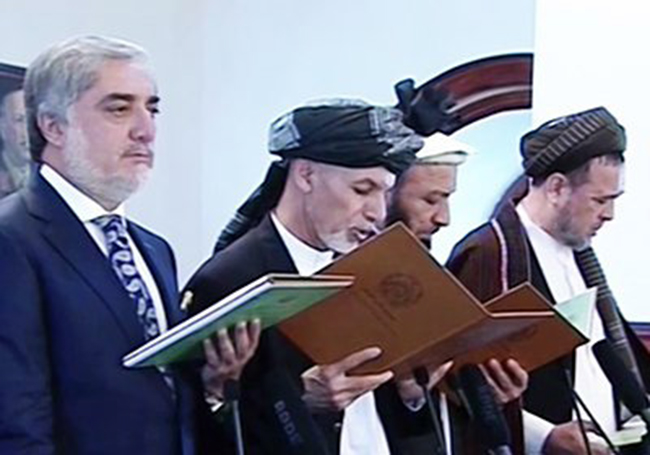It seems that Afghan National Unity Government confused with enormous challenges Unprecedented in recent history of this country. They are harshly accused of failing and not fulfilling their promises given during election: growing Insecurity, joblessness, poverty, refugees repatriation, administrative corruption, discrimination, pollutions, and health issues are considered as a result of the bad governance. Social insecurity such as robbery, kidnapping and explosions in all parts of the country including the capital has become a common practice. In addition, illegitimacy crisis is a new raised issue widely debating in the public media.
The legitimacy of the National Unity Government (NUG) derived from a political agreement is due to expire in a few days from now. Two years ago, an incompatible, two-headed government system under the national unity government was imposed on contrary to the national law. Although the people of Afghanistan defied the Taliban threats to go to the polls under tough conditions, the two front runners accepted the proposition of US Secretary of State John Kerry in lieu of respecting the will of the voters, and created a national unity government.
The fiasco of the so-called government of national unity formed from the two opposing presidential tickets was certain from its start. A number of civil activists and patriotic politicians opposed the make-up from the very beginning. Their concern came true, and all Afghans, except the two leaders, acknowledge the debacle of the government two years after its inception. The government not only has failed to deliver in areas of good governance and development affairs, but it also has not fulfilled any of its main commitments agreed upon in the power-sharing agreement. No tangible progress has been made so far with respect to the convention of constitutional Loya Jirga (grand assembly), and the electoral reforms.
Since the commencement, there have been seeing Hypocrisy and inconsistency, and even turning down the decisions of each other, and disagreeing for a 50 percent share in nearly everything, from key national issues to low-ranking appointments. Over the past two years, they did not make any significant changes in economic and political arena. Also, reported that they repeatedly blocked the appointments of individuals who are politically at odds with his team despite the fact everyone has the right to hold a different political vision or standpoint in democratic systems. Similarly, they mostly focused on appointing his own team members in the government, and even their interpretation of the electoral reform is to equally divide the seats of electoral commissions with the both team, though the people will never tolerate the division of electoral commissions under the so-called electoral reforms.
The constitutional Loya Jirga, as envisioned in the power-sharing deal that can legitimize the post of the chief executive officer through changing it into an executive prime ministerial slot but there are some unwillingness to support the convention of the Loya Jirga. The pre-determined, two-year legitimacy term of the National Unity Government, particularly of the Chief Executive Office whose legitimacy was under question from the very beginning, will expire just within a few days from now, so it is necessary to explore other solutions in the light of the Constitution and other applicable laws. Both leaders should admit their failure, and provide a chance for the people to find a solution to steer the country out of the existing problems, and the Loya Jirga is the best way to accomplish.
The National Unity Government (NUG) not only has failed to honour its biggest promise – the fight against corruption--, but the vicious phenomenon and national shame has also become more rampant. Some anti-corruption watchdogs say the NUG was initially expected to take concrete anti-corruption steps, but its performance over the past two years dashed the hopes. As in the previous government, the current government has also made sham promises in the battle against corruption, and has not taken any practical step thereof so far. While the government leaders are bragging about addressing the Kabul Bank scandal case, and the termination of fuel contracts of the Ministry of Defence (MoD) as achievements of their anti-corruption drive, none of government bodies involved in probing the two cases shares the details with mass media. Also, there are many questions and concerns about the work of the National Procurement Commission (NPC), which are yet to be addressed.
Home » Opinion » NUG Facing Fiasco and Illegitimacy Crisis
NUG Facing Fiasco and Illegitimacy Crisis
| Mohammad Zahir Akbari

